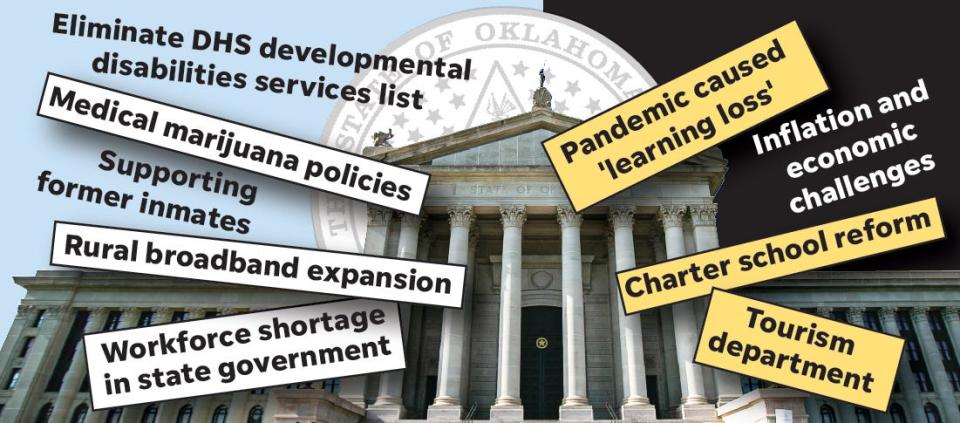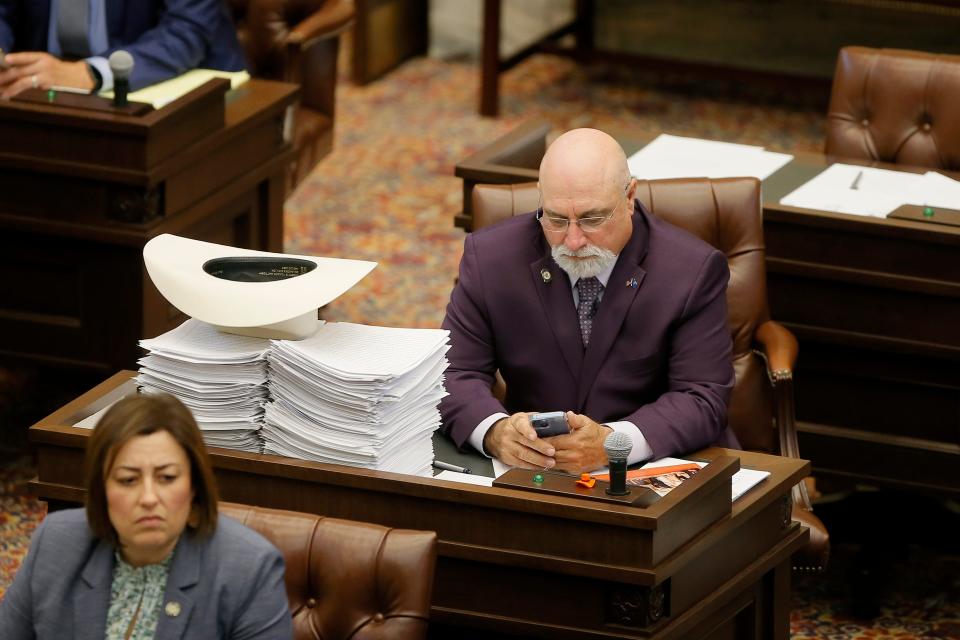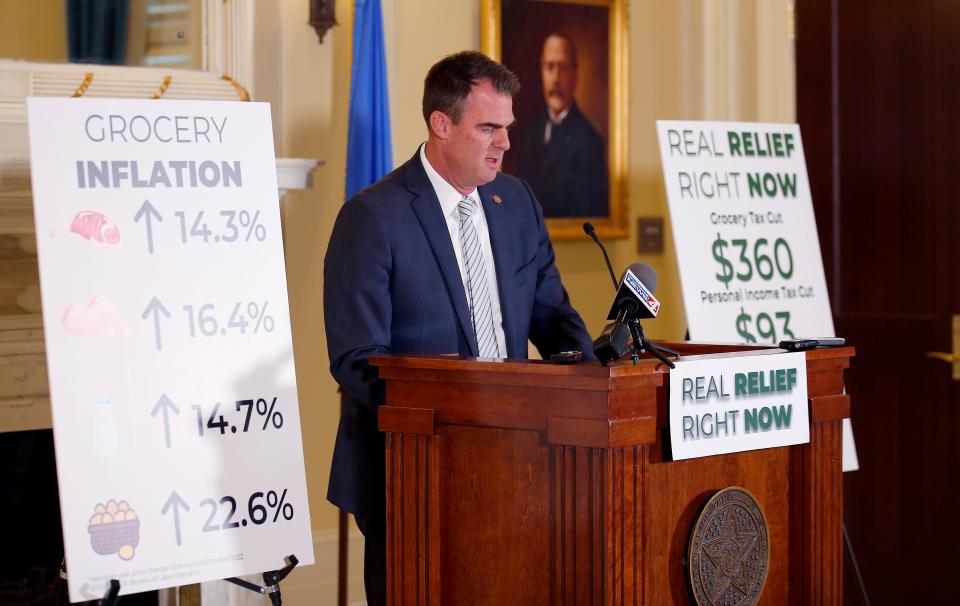Oklahoma lawmakers addressed some challenges, passed on others in just-ended session
State lawmakers gathered four months ago for their annual legislative session at a time when grocery and gas costs were rising, schools were trying to overcome the learning losses of virtual class during the pandemic, and most state agencies were warning of a worsening worker shortage.
State audits and investigative reports also highlighted possible corruption, or at least an extreme lack of oversight, when it came to some state agencies.
Four months later, the Legislature adjourned after addressing some of the state’s biggest issues, while seemingly ignoring other pressing needs altogether.
Abortion, transgender rights and school libraries received a lot of attention this year, and no doubt were important political topics for a Republican-dominated Legislature, especially during an election year.

But teachers, nurses, prison guards, social workers, farmers and many other working-class Oklahomans often see little economic relief from “culture war” debates.
When it came to policies that have the most direct impact on the state’s greatest challenges, what exactly did lawmakers get done?
Here are some challenges lawmakers addressed
DHS developmental disabilities services waiting list
For some Oklahomans with intellectual or developmental disabilities, getting access to state services has been no easy feat. In fact, some families have been waiting for up to 13 years for support.
This year, lawmakers finally allocated $32.5 million to eliminate that waiting list, a relatively small amount of money in the overall state budget that will have a major impact on thousands of Oklahomans.
“Our goal is to provide services to every Oklahoman on the DDS waitlist, and we can now begin making this a reality, transforming the lives of thousands of families," said Secretary of Human Services Justin Brown, referring to the waiting list that includes more than 5,100 Oklahomans.

Lack of broadband internet
Oklahoma is a bottom 10 state when it comes to high-speed internet connectivity, an increasingly important utility that now ranks alongside water and electricity. The lack of access is especially profound in many rural communities. Lawmakers have talked for years about creating a statewide broadband system, and this year they actually took some meaningful steps to make it a reality.
Lawmakers created the Oklahoma Broadband Office, which will oversee the use of hundreds of millions of dollars in federal funds to expand broadband internet and incentivize communications companies to expand their networks.
Because of a deadline to spend some of the federal funds, the state could see meaningful expansion within just a few years, giving nearly all Oklahoma communities access to much-needed high-speed internet.
Disorganized medical marijuana landscape
The state's growing medical marijuana industry has created problems for some communities where illegal growth facilities have brought increased crime and put unregulated marijuana on the streets.
The Legislature advanced several measures this year that provide county sheriffs more funding for enforcement, increased the penalties for selling marijuana to a person without a license and creates an independent Oklahoma Medical Marijuana Authority agency.
That stand-alone agency also will begin a moratorium on issuing business licenses in August to catch up on checks of existing businesses and applications.
While the moratorium is set to last for up to two years, the fee structure for those licenses will shift beginning in June to take into account both business size and sales figures to determine the amount of an annual license.
More: Marijuana products recalled in Oklahoma after samples found with salmonella, E. coli
Additional changes coming from the Legislature will impact the state's marijuana testing labs, which have come under scrutiny by the industry, as a new law is asking registered labs to provide recommendations by June of next year on best practices and equipment preferences that would be implemented at a later date.
Barriers facing former inmates
Oklahoma has a lot of people in prison, which means it also has a lot of people who used to be in prison. But even after a person serves their time, obstacles remain that make it hard to gain employment or rent an apartment.
This year, the Legislature approved an automatic expungement process that will wipe the slate clean for eligible people without them having to hire an attorney and appear before a judge.
“I believe that government itself should not be in the business of erecting barriers to people getting on with their lives and being productive members of society,” said Rep. Nicole Miller, R-Edmond, who authored the expungement bill.
Workforce shortage in state government
When state agency leaders presented their budget requests to lawmakers before the start of the session, a common refrain was that it's increasingly hard to find workers. Most agency leaders said low salaries compared to similar positions in the private sector were to blame.
But before the session even began, budget leaders said salary increases weren’t likely.
“It’s not a priority,” said Sen. Roger Thompson, the Senate’s budget chair, when asked about state employee pay raises at the start of the session.
Thompson's words rang true as very few state agencies saw any type of pay increase.
The Legislature did provide a pay raise to the Oklahoma Highway Patrol, where officials said they were at a 45-year low in the numbers of troopers on duty, largely due to low pay.
“The last several years have been lean for the OHP," said Kevin Crawford, president of the Oklahoma State Troopers Association. “The financial commitment demonstrated by the Legislature will go a long way in ensuring the Oklahoma Highway Patrol continues its mission as Oklahoma’s only statewide law enforcement agency.”
Oklahoma's public schools have complained about a worsening teacher shortage for years, and while a pay increase was implemented in 2018, the state continues to lose educators to higher-paying jobs in Texas, Arkansas and other neighboring states.
Even the governor acknowledged the need for better teacher pay when he pitched a six-figure salary for some teachers. The Legislature did approve a $25,500 scholarship and bonus program for college students training to become educators, and new teachers in their first five years.
"Right now, the state's teacher preparation programs are not producing the number of teachers needed to fill the vacancies in schools, and this bill has tangible solutions for changing that," state schools Superintendent Joy Hofmeister said about the bonus plan.
While there was no across-the-board pay raise for all state employees, the Legislature authorized a new annual study that will examine compensation and report on which state positions are being paid less than 90% market value, and require the state to address those underpaid positions.
Pressing needs lawmakers left unresolved
Pandemic caused 'learning loss'
Last year, student test scores showed a drop in academic achievement, largely caused by the COVID-19 pandemic, which had many school buildings shut down.
Referred to as "learning loss," many educators said an increase in state revenue should lead to a boost in education funding. Lawmakers didn't agree.
While funding was put behind a new teachers scholarship program, and a few other specific school programs, the state's common education budget next year will essentially be flat.
“There is no higher priority than investing in our public schools, yet this budget includes little new investment in education, which is essentially a cut," said Sen. Carri Hicks, D-Oklahoma City.
Charter school reform
Following a state audit that found massive financial mismanagement by Epic virtual charter school, which at one point served nearly one in 10 students across the state, the state Legislature did not impose any new reforms on the state's charter school system, including those recommended by the state auditor.
A bill was proposed this year that would have allowed the Oklahoma Statewide Virtual Charter School Board to oversee any charter school in the state, along with capping the amount of money a charter school can pay a private company for "administrative fees," which was found to be a major problem at Epic.
"Where we had loopholes in the law, we've tried to secure those the best we can," said Rep. Sheila Dills, R-Tulsa, who authored the bill.
But the bill failed to get final approval in the Legislature before the end of the session.
Tourism agency reform
A legislative committee heard a report this year of questionable spending and contracts for restaurant services at state parks, but the Legislature did not respond with any policy changes.
Oklahoma Tourism and Recreation Department Executive Director Jerry Winchester resigned after contracts he signed with Swadley's barbecue restaurant were not only questioned by lawmakers but are being investigated by state law enforcement.
Legislative leaders said there wasn't enough time to make any changes to the tourism agency before the end of the session.
"I think that this will be a longer process," said Rep. Ryan Martinez, R-Edmond. "I think everybody wants to do this correctly, wants to make sure we're digging in and getting as many facts as possible prior to making any assumptions."
Inflation and economic challenges
As prices rise on nearly all types of purchases, the state Legislature eliminated the 1.25% vehicle sales tax and issued $75 checks for each Oklahoman. However, those efforts were rejected by the governor, who called on the Legislature to return to the state Capitol later this month for a special session.

"We will get Oklahomans the most relief possible because it's the right thing to do, not because of the governor's dishonest, disrespectful demands," House Speaker Charles McCall, R-Atoka, said.
State lawmakers could still provide Oklahomans with some economic relief, but it was an issue left unaddressed when the session ended.
One financial relief measure that had bipartisan support at the start of the legislative session was ending the grocery sales tax. However, that proposal was not included in the Legislature's final budget.
Contributing: Carmen Forman and Hogan Gore, The Oklahoman
This article originally appeared on Oklahoman: Oklahoma lawmakers fail to address some of state's biggest challenges

